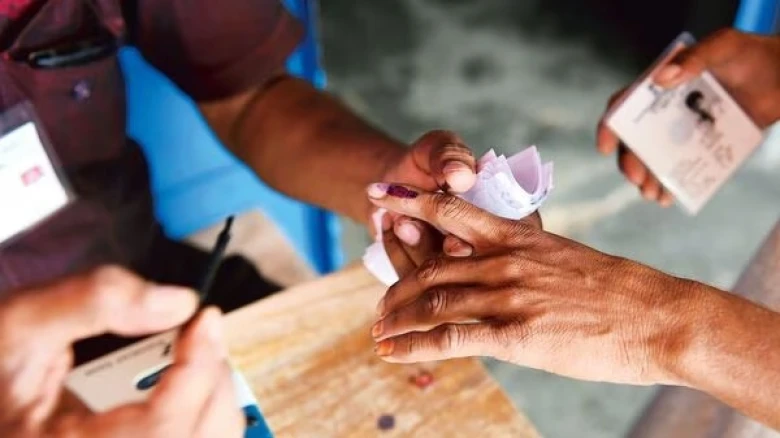Strict security measures were implemented to guarantee voter safety and the seamless operation of the voting process...
Digital Desk: In a bustling day of democracy in India, Two states, Chhattisgarh and Mizoram, witnessed the commencement of their respective assembly elections.
Chhattisgarh Assembly Polls – Phase 1:
The initial round of assembly elections, which covered 20 constituencies, began in Chhattisgarh's southern area. Strict security measures were implemented to guarantee voter safety and the seamless operation of the voting process, with polls starting at 7 a.m.
Ten constituencies—Mohla-Manpur, Antagarh, Bhanupratappur, Kanker, Keshkal, Kondagaon, Narayanpur, Dantewada, Bijapur, and Konta—were included in the first round of voting. In parallel, voting begins at 8 a.m. and will continue until 5 p.m. for the other assembly seats, which included Pandaria, Kawardha, Khairagarh, Dongargarh, Rajnandgaon, Dongargaon, Khujji, Bastar, Jagdalpur, and Chitrakote.
Elections in Chhattisgarh are being held in two stages, with the second stage scheduled for November 17. Out of the 90 constituencies in the state, 20 are up for grabs in this first phase, with 12 coming from the Bastar division. There are 40,78,681 registered voters in the electorate, 19,93,937 of whom are men and 20,84,675 of whom are women.
Additionally, the state has committed to providing equal representation for SC/ST populations, as seen by the 13 out of 20 seats that are set aside for them. Ten seats are set aside for Scheduled Castes (SCs) and 29 seats are set aside for Scheduled Tribes (STs) in Chhattisgarh.
A variety of candidates were competing for their individual constituencies in the first round of voting. Prominent individuals, including former Chief Minister Raman Singh, and State Minister Kawasi Lakhma were standing for reelection from Konta.
The Congress won 17 of the 20 seats that were up for grabs in the 2018 elections, while the BJP and Ajit Jogi's party each won two and one seat, respectively. In the 2023 elections, Savita Mandavi, the late MLA Manoj Mandavi's wife, contested as a candidate from Bhanupratappur, helping the Congress unseat six of its current MLAs.
For the 90-member parliament, the Election Commission of India reported 2,03,80,079 voters, comprising 1,60,955 voters with disabilities, 19,839 voters in the service category, and 790 voters of the gender.
Mizoram Assembly Polls:
At the same time, Mizoram assembly elections got underway. The results are expected to be counted on December 3. The voting process is scheduled to end at 3 p.m., as it began at 7 a.m.
174 candidates were competing for the Mizoram Assembly position. According to the Chief Electoral Officer (CEO) of Mizoram, there were 8,51,895 electors in the state overall, of which 4,12,969 were men, 4,38,925 were women, and 1 represented a third gender. In addition, Mizoram had 4,973 service voters. Interestingly, 50,611 people in the 18–19 age range were first-time voters. In Mizoram, the electoral population (EP) ratio was 63.27 and the sex ratio of voters was 1,063. The state had a total of 1,276 voting stations, with 525 in urban areas and 751 in rural areas.
With 2,058 votes cast at home and 7,497 via mail at specified polling places for the assembly elections, Mizoram has previously experienced both in-person and mail-in voting.
The 40-member Mizoram Assembly offered a distinct political environment, as the Congress and the Bharatiya Janata Party (BJP) were not the main challengers. With a vote share of 37.8% and 26 seats secured in the 2018 elections, the Mizo National Front (MNF) put an end to the Congress government's ten-year power. With eight seats won, the regional Zoram Peoples Movement (ZPM) was viewed as a serious threat to the incumbent party. The BJP won its first seat in the state, while the Congress took home five seats.
The MNF chose not to join a pre-election coalition with its state partner, despite being a member of the BJP-led National Democratic Coalition (NDA). The BJP was running for 23 seats as compared to 39 in 2018.
Among the well-known candidates running for reelection were the State Congress Chief, Lalswata, and the current Chief Minister, Zoramthanga. The president and founder of the Zoram Nationalist Party, Lalduhoma, was involved in the conflict as well.

Leave A Comment